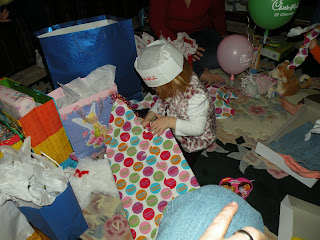I mentioned in a previous post that Landon has been making great strides in his development lately. The most impressive and exciting, at least to me, is that he is now feeding himself and eating "normal" foods. Prior to Easter Sunday, Landon wouldn't really eat anything other than stage 2 baby foods. We would thicken them with cereal, but if there was any texture, such as chunks, hunks or lumps, he would gag, choke and spit the food right back out. We offered things such as crackers, cheetos, puffs - anything that Landon could pick up - however he wasn't interested in eating them. Just playing with them by banging them on the tray or together. And, he didn't care to drink from anything but a bottle.
Because my 14 month old was still relying mostly on bottles of formula for nutrition and was having difficulty with any texture beyond a stage 2, I requested that he receive the services of a speech therapist. A speech therapist, you ask? For those not well versed in speech and language pathology, a speech therapist, ideally, works on all aspects of speech - to include oral motor development.
I think one of the most interesting topics that I have learned about since Landon's birth has been oral motor development. It is absolutely unbelievable all that goes into speech and the mechanics of talking. You and I take it for granted, but think about those times that you have been to the dentist, your mouth numb. It wasn't quite so easy to articulate then, was it? Well that is what Landon has to fight against, as well as other children with Down syndrome. Low muscle tone strikes again.
I attended a seminar on oral motor development last summer. It was presented over 2 Saturdays, 7 hours each day. It was probably the most valuable information that I've learned so far. And it wasn't just the information presented in the seminar. The most valuable wisdom I gained that day came from parents of older children with Down syndrome. Though their children were verbal and had the ability to understand others, their ability to be understood by others was impaired. They couldn't clearly articulate their words.
Think about your child at 2. At that age, they are verbal, but many words aren't clear. Most of the time, you as the parent understand what they are saying, however you find yourself "interpreting" for your child with other folks. The parents at this seminar found themselves still "interpreting" though their child was 12 or 24.
There is debate within the medical community, as I have read, to whether folks with Down syndrome have a large tongue. Some say, it is just the low tone that causes the tongue "thrust", the image of how you may picture a person with Down syndrome, mouth open, tongue hanging out. The tongue, just like the lips and the jaw, contain muscle that can be conditioned and strengthened. But, you can't really lift weights to tone up these muscles (however there are exercises that can be done, silly as they may look to do them!).
One thing I learned at this seminar is that the earlier you begin to condition the muscles, then it is that much less you have to work at it later. Which brings me back to speech therapy for Landon's feeding issues. Landon just eating stage 2 foods does not exercise his jaw, tongue or lips. He needs chunks in his mouth so that his tongue will move side to side, push food forward and backward. He needs to start drinking from a straw to work on his lips. He needs to chew food to strengthen his jaw. All of this eating is the foundation for speech later. Crazy, huh?
The Friday before Easter Sunday was Landon's first feeding therapy appointment. No, I don't think that she worked any special magic that day. But, I'm not sure what made him pick up the cheese puff I gave him two days later, take a bite, chew on it and swallow without gagging. In case you were wondering what took place during that session - I brought various foods with me and fed Landon. The therapist observed, offering suggestions on how to slowly incorporate more texture. Where I would set a cracker on the table and wait to see what Landon would do with it, she said crumble it up in his food. We tried that. As long as it was a pretty fine powder he was fine. If I tried to sneak in a larger chunk, he would gag and spit the food out. He would also vehemently shake his head no at me.
So over the next week, with wonderful Mary following these recommendations during the day, Landon became able to tolerate more texture. By the following Friday, our next session with the therapist, Landon shocked me by eating fork mashed green beans. Granted, they had to be mixed in with baby food, but he ate them! And guess what he did last night?! He ate the fork mashed green beans without mixing them. He still continues to pick up any kind of food we put down on his tray and try to eat it. Sometimes, the food works its way out of his mouth, but sometimes he swallows. And what a triumph for him to swallow and not gag. Sheer elation best describes how I feel each time I see him eat something I know he couldn't before.
I know Landon will walk. I know he'll reach his other milestones. But when I think about his future, and him being able to become a self-supporting, happy and independent adult, his ability to clearly communicate with others will be imperative. To be understood will help boost his esteem and confidence and open many more doors of opportunity. And that is why feeding therapy is so important to me, but especially Landon.









